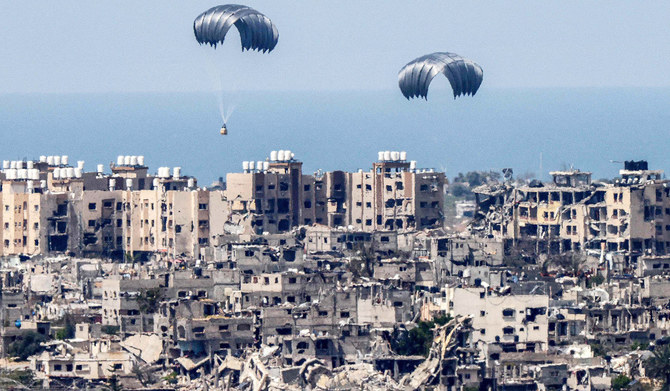
- ARAB NEWS
- 05 Jul 2025

GAZA STRIP, Palestinian Territories: The United States said Tuesday it would continue airdrops of aid to besieged Gaza, despite pleas from Hamas to stop the practice after it said 18 people had died trying to reach food packages.
Hamas demanded that its enemy Israel instead allow more aid trucks to enter the war-torn territory, which the United Nations has warned is on the brink of a “man-made famine” after nearly six months of war.
Fighting raged unabated on Tuesday, a day after the UN Security Council passed its first resolution calling for an “immediate ceasefire” and urging the release of the roughly 130 hostages Israel says remain in Gaza, including 34 captives who are presumed dead.
The health ministry in Hamas-run Gaza said 12 people including some children were killed when an air strike hit a displacement camp late on Tuesday near the southern city of Khan Yunis.
And Israeli forces were continuing an assault on Gaza City’s largest hospital, and their forces have surrounded two other medical facilities in Khan Yunis.
The Palestinian Red Crescent warned that thousands were trapped in the Nasser hospital in Khan Yunis and “their lives are in danger.”
The war sparked by Hamas’s October 7 attack on Israel has shattered Gaza’s infrastructure and aid agencies say all of its 2.4 million people are now in need of humanitarian help.
Six people were killed in stampedes and 12 others drowned off the territory’s Mediterranean coast trying to salvage aid packages, the Hamas government and the Swiss-based Euro-Med Human Rights Monitor said.
“People are dying just to get a can of tuna,” Gaza resident Mohamad Al-Sabaawi told AFP, holding a can in his hand after a scramble over an aid package.
Hamas in a statement called for “an immediate end to airdrop operations” and “the immediate and rapid opening of land crossings.”
The UN children’s fund, UNICEF, said vastly more aid must be rushed into Gaza by road rather than air or sea to avert an “imminent famine.”
UNICEF spokesman James Elder pointed out that the necessary help was “a matter of kilometers away” in aid-filled trucks waiting across Gaza’s southern border with Egypt.
The US National Security Council said in a statement later they would continue trying to get aid in on the road.
But the statement added that airdrops were “one of the many ways that we are helping to provide desperately needed aid to Palestinians in Gaza, and we will continue to do so.”
AFPTV footage showed crowds rushing toward aid packages on Tuesday parachuting from planes sent by Jordan, Egypt, the UAE and Germany.
Israeli troops meanwhile battled Hamas with no sign of a let-up, with the military saying its jets had struck more than 60 targets, including tunnels and buildings “in which armed terrorists were identified.”
The Security Council resolution passed Monday demanded a ceasefire for the ongoing Muslim holy month of Ramadan that should lead to a “lasting” truce.
Israel’s top ally the United States, which had blocked previous resolutions, abstained from the vote, prompting Israel to cancel a planned visit by senior officials.
Hamas leader Ismail Haniyeh said Israel was experiencing “unprecedented political isolation” and losing US “protection” at the Security Council.
Washington has baulked at Israeli Prime Minister Benjamin Netanyahu’s determination to launch an assault on Rafah, a southern city where most of Gaza’s population is now sheltering.
The US has also expressed increasing concern over the humanitarian toll.
Ahead of a meeting with his Israeli counterpart, US Defense Secretary Lloyd Austin said that in Gaza “the number of civilian casualties is far too high, and the amount of humanitarian aid is far too low.”
The October 7 attack resulted in about 1,160 deaths in Israel, mostly civilians, according to an AFP tally of Israeli official figures.
Israel’s retaliatory campaign against Hamas has killed at least 32,414 people in Gaza, most of them women and children, according to the territory’s health ministry.
Officials from the two sides are in indirect mediated talks in Qatar aimed at sealing a ceasefire and a hostage release.
But both Hamas and Netanyahu said the talks were failing and blamed each other.
Qatari foreign ministry spokesperson Majed Al-Ansari said on Tuesday the talks were “ongoing,” adding there had been no “development that would lead to thinking that one of the teams has pulled out of the negotiations.”
On the ground in Gaza, dozens of Israeli tanks and armored vehicles surrounded the Nasser Hospital in Khan Yunis, where thousands of displaced people have sought refuge, witnesses said.
The health ministry said shots were fired around the sprawling complex, but no raid had yet taken place.
At Gaza City’s Al-Shifa Hospital, the territory’s largest, Israeli troops have been engaged in heavy fighting for nine days. Israel claims to have killed 170 Palestinian militants and arrested hundreds.
On Monday, the Israeli military reported killing about 20 fighters in a day around Al-Amal Hospital in Khan Yunis, in combat and air strikes.
Israel has labelled its action “precise operational activities” and said it had taken care to avoid harm to civilians, but aid agencies have voiced concern for non-combatants caught up in the fighting.
Palestinians living near Al-Shifa have reported corpses in the streets, constant bombardment and the rounding up of men who are stripped to their underwear and questioned.
AFP